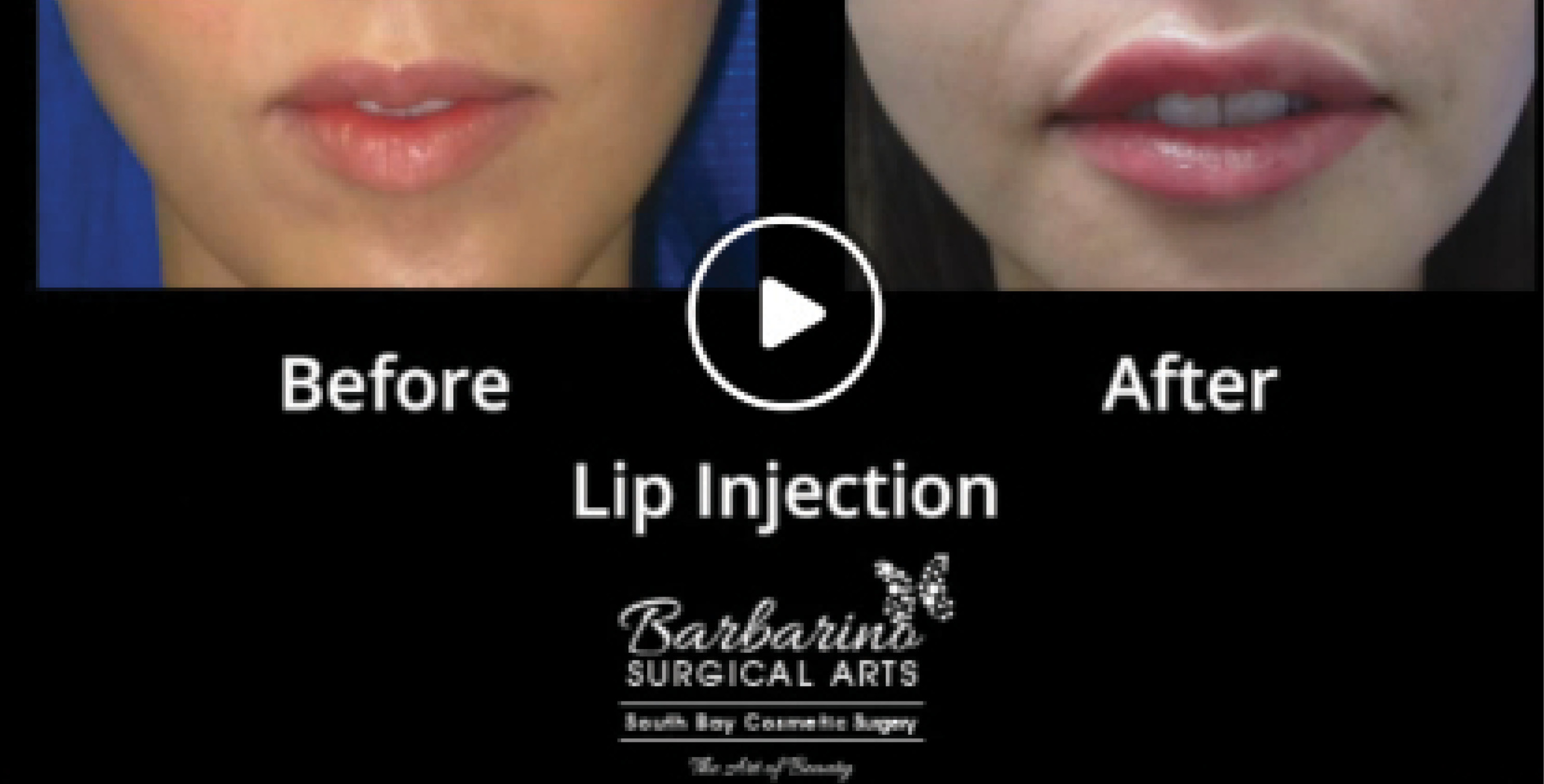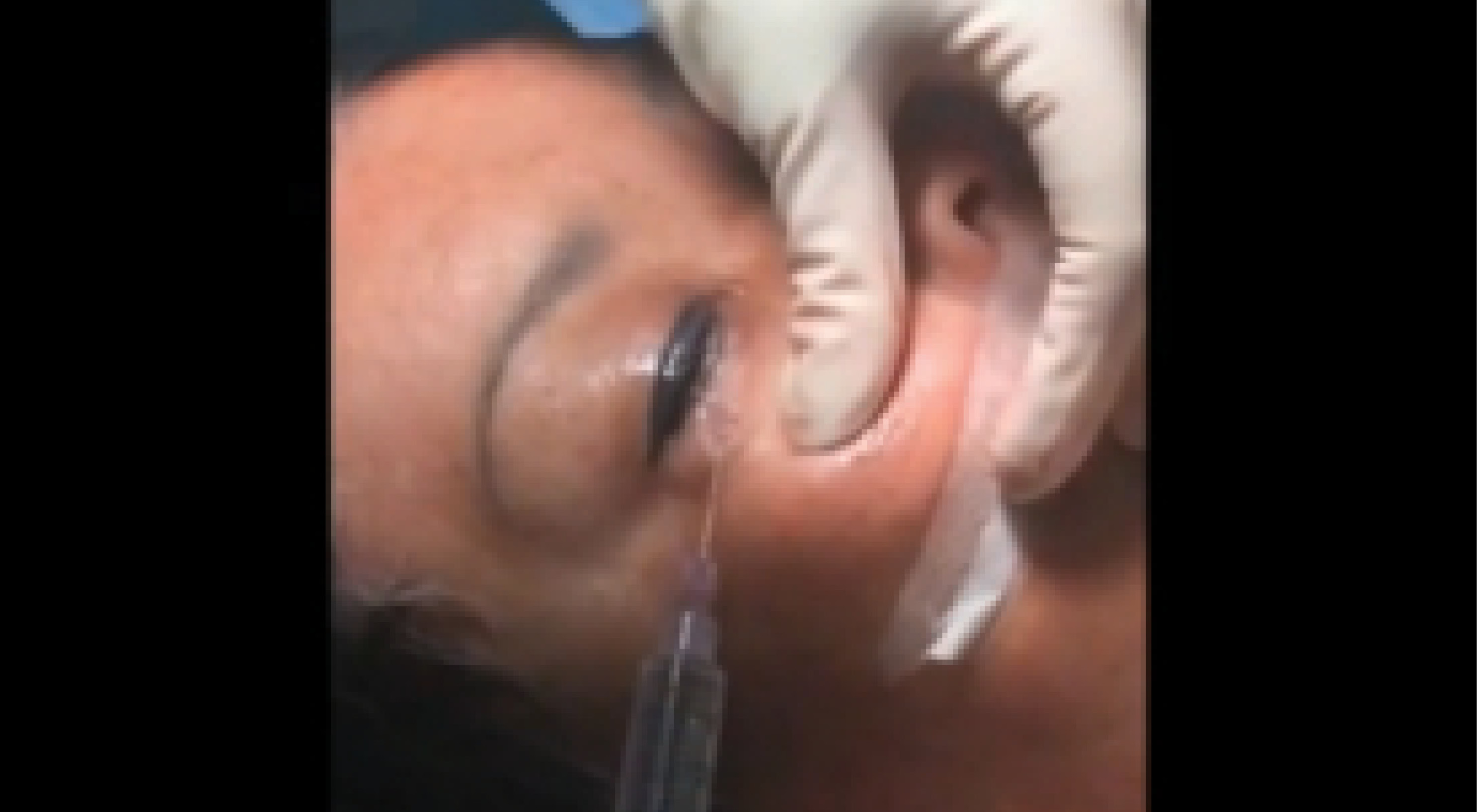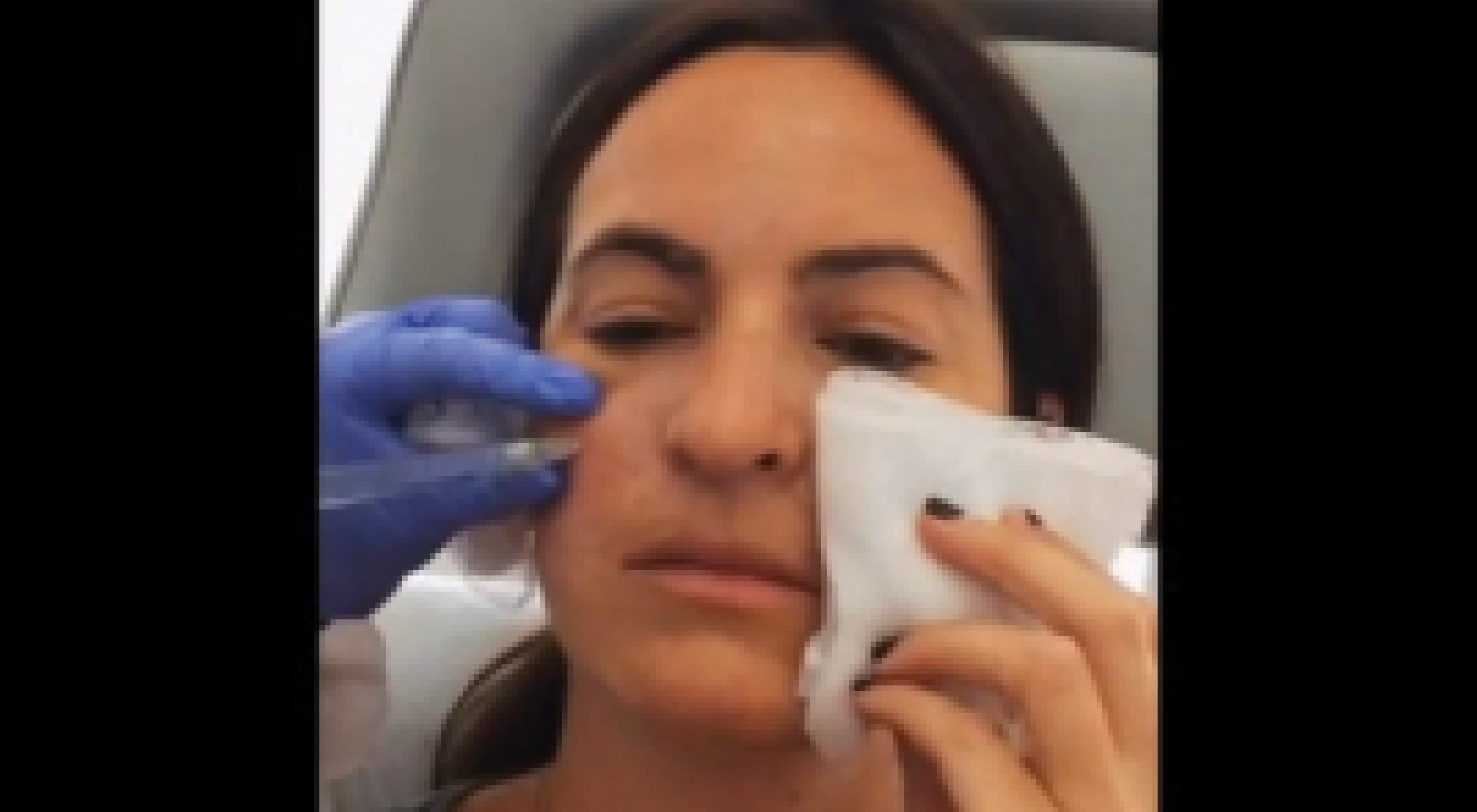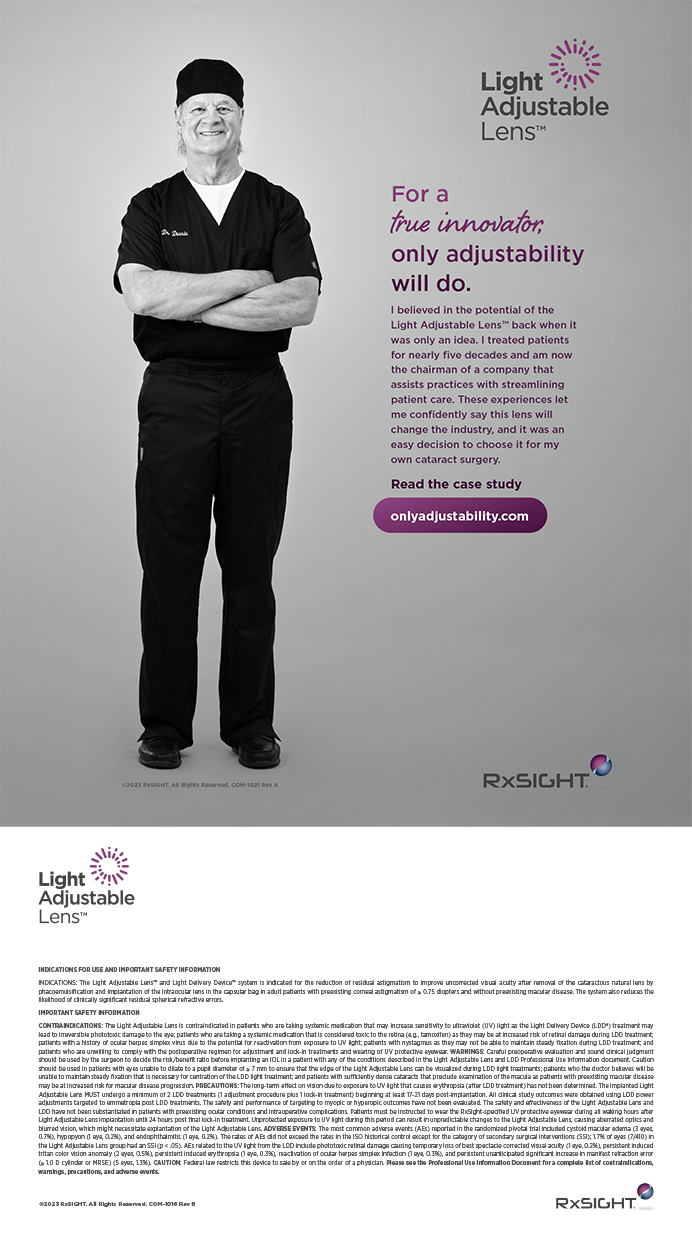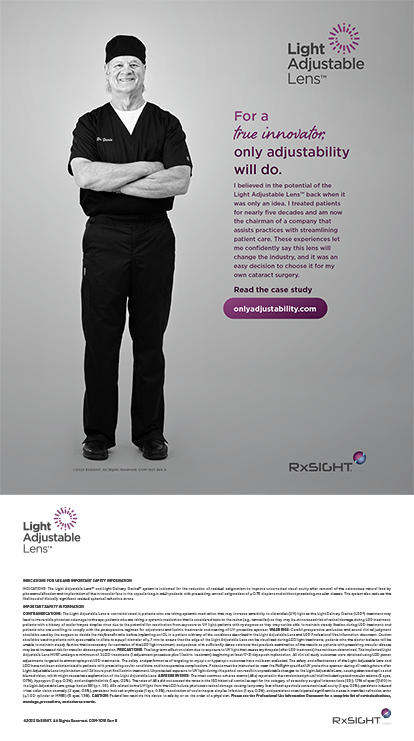
Cosmetic plastic surgeons can offer many types of treatments to patients who are dissatisfied with the appearance of their eyes or face. Options range from the injection of fillers or neuromodulators to laser treatments to various types of surgery. An oculoplastic surgeon in a cosmetic plastic surgery practice must have numerous aesthetic services at his or her command and be able to advise each patient on what are the best and most appropriate options for that individual.
This article describes some of the procedures offered by my practice, Dell Laser Consultants in Austin, Texas, and the conditions each can address. Ophthalmologists who want to refer patients for cosmetic oculoplastic procedures should familiarize themselves with the services offered by their local subspecializing surgeons in order to properly advise patients and discuss cases with the surgeon.
BLEPHAROPLASTY
Eyelid surgery or blepharoplasty can improve the appearance of tired-looking eyes, a condition that can be caused by numerous factors, including aging, genetics, and medical conditions. Blepharoplasty reduces excess skin and fatty deposits, which can appear as puffiness, from the upper and lower eyelid areas. Removing and tightening sagging skin around the eyes leaves the patient with a rejuvenated appearance and skin that is smoother, tauter, and more youthful.
Upper eyelid surgery can be performed for drooping upper eyelid skin or a crepe-like appearance of the skin that prevents women from applying eye makeup or mascara. Occasionally, a patient’s vision can be affected, as droopy eyelids obstruct the field of vision. Patients with this medical problem often have eyelid skin weighing down their upper eyelashes.
Most patients who have an obstructed peripheral visual field are not aware of it. For these patients, the eye care provider can conduct a visual field test with the eyelids taped and untaped to reveal how much of the visual field is obstructed by the excessive eyelid skin. Blepharoplasty can improve the patient’s vision by modifying the drooping eyelid that is obstructing the field of view; in these cases, insurance will often pay for the surgical procedure.
During upper eyelid surgery (whether for cosmetic or medical reasons), incisions are made in the natural folds of the eyelid, in the crease of the upper eyelid. Excess skin is removed, and sometimes the eyelid fat pads are removed or reduced. The surgeon can sometimes also tighten the upper eyelid muscle during surgery. The skin is then meticulously closed with suturing that is removed in 5 to 7 days.
Lower eyelid blepharoplasty is usually performed for cosmetic reasons. Lower eyelid blepharoplasty can address excessive bulging of the lower eyelid fat pads, deep hollowness under the eyes next to areas of bulging fat pads, or just excessive lower eyelid skin that does not look appealing. Patients who are good candidates for lower eyelid surgery complain about puffiness of the lower eyelids and the loose skin that makes them look tired even when they are not.
In surgery, the incisions are made either just beneath the lashes on the skin or behind the inner lower eyelid. Just as in upper eyelid surgery, fat pads of the eyelid may be removed depending on the problem. In my practice, when a patient has excessive hollowness, instead of removing the fat pad, I often transpose it to an area where fat is needed.
I then remove skin, if external tightening is necessary. If no skin is removed, the incision is internal, so no sutures are needed. If excess skin is removed, the incision is closed with a fine running suture. Depending on the way that the surgeon operates, most incisions are virtually unnoticeable after the healing process is complete. Removing the fat pads in the lower eyelids can improve the puffiness of the lower eyelids and the overall contour of the lower eyelid area.
Patients who have hollowness or puffiness around their eyes but do not want surgery can opt for strategically placed injectables, or fat can be used to replace lost volume to help achieve a more rested and youthful appearance.
CHEMICAL PEELS
Chemical peels are used to treat fine surface wrinkles, pigment problems, loose skin, acne, and other conditions that develop due to genetics or the natural aging process. In a chemical peel, a chemical solution is used to improve the texture of the skin by removing the damaged outer layers; dead skin cells are eradicated, prompting the production of collagen and elastin, tightening of the skin, and drying up of active sebaceous glands. After the process is complete, newer and healthier skin is then able to rise to the surface.
The procedures take only 10 to 15 minutes, and patients can resume daily activities without downtime. The patient’s skin will peel for 5 to 7 days, depending on the individual’s own healing process. Sun exposure should be limited, and sun block must be worn every day to protect the new layer of skin.
Chemical peels can erase fine lines and wrinkles, even out skin discoloration, and improve skin texture. Although chemical peels are used mostly on the face, they can also be used to improve the skin on the neck, chest, and hands.
INTENSE PULSED LIGHT
Intense pulsed light (IPL) is a technology used by cosmetic and medical practitioners to perform various aesthetic and therapeutic skin treatments, including hair removal, removal of sun and age spots, removal of melasma (darkening of the skin due to hormonal changes), reduction of redness, treatment of rosacea, repair of dilated or broken blood vessels, and treatment of dermatologic diseases.
IPL is a popular treatment that is best known for its ability to treat conditions such as facial redness, acne, hyperpigmentation, sun damage, and fine lines or wrinkles. IPL also stimulates the production of collagen, plumping up the skin and giving the patient a younger, fresher look.
IPL has also been found to be useful in treating meibomian gland dysfunction (MGD) in evaporative dry eye disease and improving related symptoms.1 When treatments for MGD such as eye drops and warm compresses have been exhausted, in my opinion, IPL is the next best solution. In IPL, high-frequency bursts of light are directed at the lower eyelids and upper cheek areas, heating the eyelid glands, and melting away any hardened secretions that have blocked the glands and caused MGD. The treatment also reduces telangectasia on the lids.
Early studies showed that, when IPL irradiation is flashed at a blood vessel, causing photocoagulation, this melts the blocked gland’s hardened secretions, unblocking the gland. Additionally, shutting off the blood vessel reduces the inflammatory mediators that cause inflamed lid margins. Therefore, IPL treats both the inflammatory and vascular components of dry eye disease and MGD, which are missed by standard eye drop, antibiotic, and warm compress treatments.
The author performs a lip injection using Belotero (Merz Aesthetics).
The author performs eyelid surgery.
The author injects Juvederm Voluma in the midcheek.
LASER HAIR REMOVAL
Laser hair removal is one of the most commonly performed cosmetic procedures in the United States. In laser hair removal, highly concentrated light energy is projected into hair follicles, and the pigments in the follicles absorb the light, causing destruction of the hair. Laser hair removal can permanently reduce unwanted body hair comfortably in five to six treatments spaced 4 to 6 weeks apart. Patients need to be re-treated once every 1 or 2 years, depending on their hair regrowth, in order to maintain the hair removal.
I use the high-speed LightSheer Duet with HS (Lumenis) for permanent hair reduction because of its effectiveness and comfort for the patient. The device uses an innovative vacuum-assisted technology, combined with the largest spot size on any diode laser, according to the company, to provide comfortable and rapid treatment of large areas. I can treat backs and legs in only 15 to 20 minutes without prenumbing the area being treated. Additionally, this is one of the few lasers that can be used to treat skin types up to a Fitzpatrick type V.
Because hair removal systems target the pigment in the hair follicles, blonde hair, peach fuzz, and grey hair cannot be treated with lasers. I often suggest to patients with these types of hair who desire hair removal that they can have electrolysis instead.
BOTULINUM TOXIN
Botulinum toxin type A (onabotulinum toxin A injection [Botox Cosmetic; Allergan]) is an FDA-approved treatment that softens and relaxes frown lines in the area between the eyes, crow’s feet, and forehead wrinkles. Neuromodulators such as botulinum are used to treat movement lines of the forehead, glabella, and crow’s feet. Treatment for both frown lines and crow’s feet can be given at the same time.
Botulinum is administered via small intramuscular injections that patients easily tolerate. The effects of injections last for 3 months typically, but they can last for up to 6 months depending on the patient. These injections cannot be administered to any patient who is pregnant or breastfeeding.
This treatment is appropriate for those seeking a smoother skin appearance by temporarily minimizing the frown lines and the lines that appear to the side of the eyes when a person laughs. The injections should not freeze one’s facial expression, although they can if too much is administered. Treatment helps prevent facial movements that cause wrinkles and make a person look tired; thus, it makes him or her look well rested.
At Dell Laser Consultants, I often use botulinum for off-label indications such as to decrease the appearance of lip lines, bunny lines (the lines on the side of a person’s nose when making a bunny nose), neck wrinkles, a crepe-like appearance underneath the eyes, and chin wrinkles. Injections to these movement lines can make a person look younger, more well rested, more refreshed, and less angry, and they can help prevent the development of more wrinkles and fine lines in the future.
Recently, researchers in Canada showed that botulinum may have the additional temporary benefit of increased pliability and elastic recoil in areas of treated skin, similar to a radiofrequency skin tightening procedure.2
TREATMENTS FOR CROW’S FEET
Crow’s feet are the lines that form around the side of a person’s eyes when smiling and making expressions with the eyes. These lines can become permanent, more noticeable, and deeper if they are left untreated. Often, a patient’s crow’s feet have already set in by the time they enter our office, and the lines are present even when the patient is not smiling or making any movement around the eyes. Patients often want to reverse these set-in lines.
Botulinum is the only drug with US regulatory approval for the treatment of crow’s feet. In my practice, I have used hyaluronic acid fillers, an off-label usage, to improve both deep wrinkles and superficial lines in this area. Fillers injected in this area, will smooth out crow’s feet discreetly and instantly. Occasionally, patients prefer chemical peels or a fractionated laser treatment to this area as it will erase the appearance of the lines and also tighten the fragile area. In my opinion, a combination of these modalities is the best and most effective way of treating this difficult area. I tell patients that, once a credit card has a fold in it, it is an uphill battle to reverse the crack, but it is possible.
Every patient who is concerned about this delicate eye area should be using an eye cream; I like to recommend D-E-J eye cream and Teamine Eye Complex (both Revision Skincare). Everyone, young or old, should be using sunscreen daily, whether they will be outdoors or indoors.
BROW LIFTS
A forehead lift or brow lift corrects sagging in the skin of the forehead, upper eyelids, crows’ feet, and eyebrows. Some people have a brow lift at the same time as a facelift. Patients who have excess upper eyelid skin do not always need upper eyelid surgery. Occasionally, as a person ages, it is the brow position that drops with gravity, resulting in excessive upper eyelid skin.
To determine which procedure might be necessary for a particular patient, the doctor must have the patient close the eyes and relax the eyebrows, then open the eyes. Before the patient naturally recruits the frontalis muscle, if it is a woman, the ideal brow position is several millimeters above the orbital bone; for a man, the ideal brow position is at the brow bone.
If the patient has a low-brow position and upper eyelid surgery is performed, the patient will be very unhappy, because it is the wrong surgery for the problem. It will not improve the upper eyelid appearance and will lower the brow position further.
I perform a brow lift by creating four incisions, all in the hairline. The first two start at the top of the ears and continue up the side of the head approximately 3 inches to address any lateral sagging of the brows or face and crow’s feet. Two additional small incisions are placed in the hair behind the hairline of the forehead, about 2 cm back; these are made to address the sagging forehead and upper eyelid skin. The procedure takes approximately 2 hours in the OR and patients experience minimal downtime.
Brow lift surgery is an extremely rewarding surgery for patients, as they will be able to easily apply eye makeup, will look and feel more awake, and will appear more well rested and youthful.
CONCLUSION
It is an exciting time to be a cosmetic plastic surgeon, as we have more effective techniques and technologies in our armamentarium to treat every problem that patients struggle with. An unknown author once said, “If it is medicine that has given years to life, it is aesthetic surgery that has given life to years.” n
1. Toyos R, McGill W, Briscoe D. Intense pulsed light treatment for dry eye disease due to meibomian gland dysfunction; a 3-year retrospective study. Photomed Laser Surg. 2015;33(1):41-46.
2. Bonaparte JP, Ellis D. Alterations in the elasticity, pliability, and viscoelastic properties of facial skin after injection of onabotulinum toxin A [published online ahead of print May 21, 2015]. JAMA Facial Plast Surg. doi: 10.1001/jamafacial.2015.0376.
Sheila C. Barbarino, MD
• cosmetic plastic surgeon at Dell Laser Consultants, Austin, Texas
• (310) 402-2255; sheila.barbarino@gmail.com; drsheilabarbarino.com
• Financial disclosure: None acknowledged

